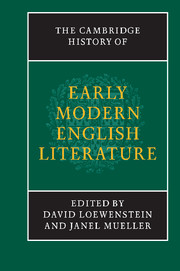Book contents
- Frontmatter
- Introduction
- 1 Modes and means of literary production, circulation and reception
- 2 The Tudor era from the Reformation to Elizabeth I
- 3 The era of Elizabeth and James VI
- 4 The earlier Stuart era
- 5 The Civil War and Commonwealth era
- 21 Literature and national identity
- 22 Literature and religion
- 23 Literature and London
- 24 Literature and the household
- 25 Alternative sites for literature
- 26 From Revolution to Restoration in English literary culture
- Chronological outline of historical events and texts in Britain, 1528–1674, with list of selected manuscripts
- Select bibliography (primary and secondary sources)
- Index
- References
23 - Literature and London
from 5 - The Civil War and Commonwealth era
Published online by Cambridge University Press: 28 March 2008
- Frontmatter
- Introduction
- 1 Modes and means of literary production, circulation and reception
- 2 The Tudor era from the Reformation to Elizabeth I
- 3 The era of Elizabeth and James VI
- 4 The earlier Stuart era
- 5 The Civil War and Commonwealth era
- 21 Literature and national identity
- 22 Literature and religion
- 23 Literature and London
- 24 Literature and the household
- 25 Alternative sites for literature
- 26 From Revolution to Restoration in English literary culture
- Chronological outline of historical events and texts in Britain, 1528–1674, with list of selected manuscripts
- Select bibliography (primary and secondary sources)
- Index
- References
Summary
London twas thou that didst thy Prince betray
And could thy sable vent no other way.
Fragment of anonymous elegy on Charles I,
Cardiff Central Library, ms 1.482, fo. 33vContexts and conditions
As Chapter 21 in this volume demonstrates, the civil crisis of the mid-century was one that embraced three kingdoms and a principality. It drew England into several armed conflicts with other west European states: most significantly, that other maritime and Protestant power, the United Provinces. Additionally, the literary consequences of the war of the three kingdoms, and the First Dutch War (1652–4), were felt in the English language used in the provinces, in Scotland, Ireland and Wales, in the Celtic language cultures of these places, and in Dutch literature.
London, however, was at the heart of the Civil War, and understanding its unique role is one of the keys to understanding the nature of the English Revolution and the literary innovations of these years. London was important not merely because it was the capital city of the nation, the major centre of population and of commerce. It was also near the places where government occurred and where the theatre of state played itself out. London’s peculiar urban culture gave the capital a life of its own. We might more accurately say, a set of lives, since in the twenty years of Civil War, revolution and experimentation with non-monarchical forms of government, various forces would emerge from London culture and have a decisive effect on the turn of events in the nation at large.
- Type
- Chapter
- Information
- The Cambridge History of Early Modern English Literature , pp. 714 - 736Publisher: Cambridge University PressPrint publication year: 2003



